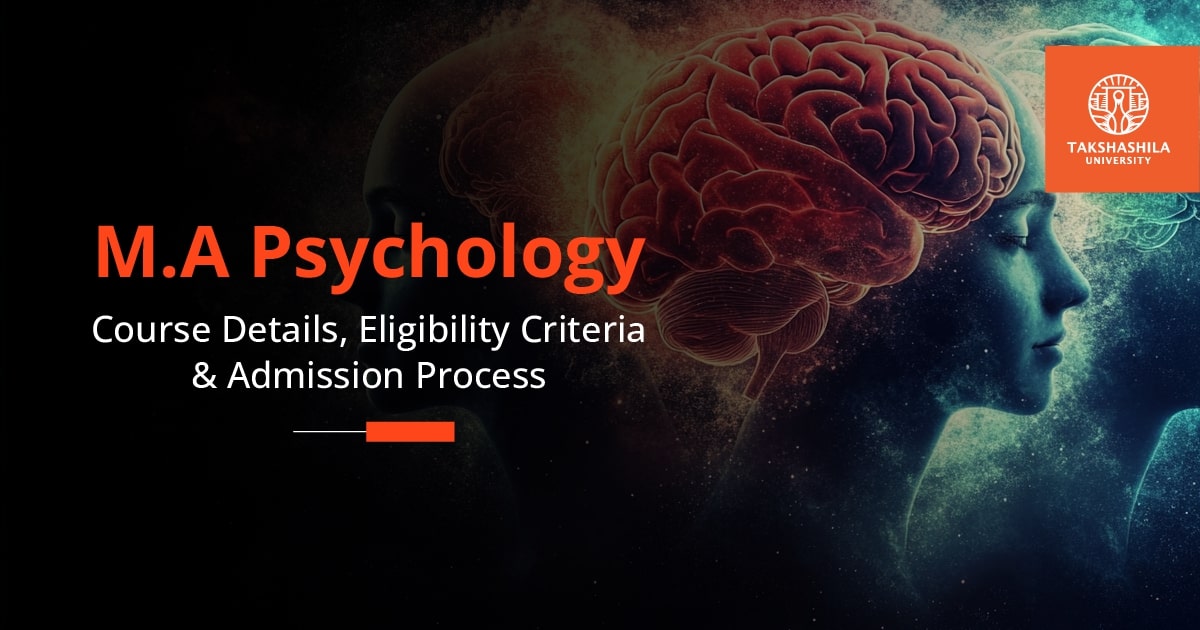Introduction to M A Psychology
M A Psychology Course is a postgraduate degree that delves into human behaviour, emotions, cognitive processes, and mental health. The course blends theoretical understanding with practical training, equipping students for careers in counselling, therapy, research, education, and various psychology-related fields. It is ideal for those passionate about understanding the human mind and helping others through psychological support.
Takshashila Engineering College offers an M.A. psychology program emphasising academic rigour and practical skills, ensuring students can address complex psychological issues in diverse settings.
In this article, we examine all the details about the M.A. Psychology program, including the Course Details, Eligibility Criteria, and Admission Process.

Overview of the M.A Psychology Course
The M.A. Psychology program can be completed in two years and has a total of four semesters. Some significant courses include cognitive psychology, social psychology, and psychopathology and majors in organisational behaviour, clinical psychology, and child psychology. Students also undertake internship programs and projects to work empirically in the field.
Critical Concepts in M.A Psychology
The program delves into a range of core and advanced topics, including:
- Cognitive Psychology entails recovering mental processes such as memory, perception and problem-solving.
- Developmental psychology aims to understand one’s psychological growth and how this affects a person from infancy to the level of an elder.
- Social psychology is studying how social context shapes a person’s behaviour and worldview.
- Psychopathology: A description of a disorder, it’s etiology and therapeutic interventions.
- Clinical psychology: Specialization in identifying cases and furnishing adequate therapeutic measures to clients
- Research Methodology: Studying both quantitative and qualitative methods for psychology research
Emerging Fields in Psychology
The discipline of psychology is constantly evolving, with new fields gaining prominence:
- Psychology is always seen to be growing, and therefore, other newer branches may be developed:
- Neuropsychology: The area that tries to understand and link the brain with human behaviour.
- Positive psychology: The insights that deal with the elements of an individual’s well-being, resiliency and strengths of the human being.
- Forensic psychology: The practical branch dealing with the application of psychological principles to law and crime.
- Sport psychology: Psychological enhancement of sporting performance.
- Health psychology: The development and maintenance of physical and psychology by changing behavioural aspects.
Career Opportunities in M.A Psychology
An M.A Psychology degree offers diverse career paths, including:
- Clinical Psychologist- Responsible for the diagnosis and treatment of patients with mental disorders and health issues within a clinical environment.
- Counsellor- A professional concerned with guiding a person, family or group.
- Organisational Psychologists- They work to increase productivity at the workplace and the general well-being of employees.
- Educational Psychologist- Helping students facing learning and behavioural challenges.
- Researcher- A person who studies to have something new to add to psychological resources.
- Psychometrician- A person who prepares and understands other people’s hypotheses or psychological tests.
Research and Laboratory Roles
- We are designing experimental studies that inform about certain cognitive or behavioural phenomena.
- Data analysis tools such as SPSS or R are used to analyse data.
- We are publishing research studies in journals or presenting them at conferences.
Industrial Applications of Psychology
- Human Resource Management: Improving employee satisfaction and organisational efficiency.
- Marketing and Consumer Behavior: Analyzing consumer preferences and decision-making.
- Health Care: Developing intervention strategies for patients and communities.
- Criminal Justice: Profiling offenders and aiding in rehabilitation efforts.
Eligibility Criteria for M.A Psychology
Academic Requirements
- A bachelor’s degree in Psychology, sociology, or any other related field with an aggregate of at least fifty per cent and sixty per cent.
- Depending on the particular institution, candidates with a Psychology, social work, or education background in the area may also be included.
Age and Other Considerations
- There is no strict enforcement on the age limit for admission at most institutions, especially with maturities.
Skills Required for Psychology Students
- They must have good writing as well as speaking abilities.
- Compassion and recognition of emotion.
- Capacity for analytical reasoning as well as resolving scenarios.
Admission Process for M.A Psychology
Entrance Exams and Application Process
- Entrance Exams: Some universities have their own entrance tests for candidates interested in taking admission in psychology and general reasoning, such as DUET, BHU PET, JNUEE, etc.
- Application Process—The application form should include Academic transcripts, a statement of purpose, and letters of recommendation.
- Personal Interview:-For the candidates who get shortlisted, an interview may be conducted to test their interest and knowledge in psychology.
Curriculum and Course Structure
Year-wise Breakdown of Subjects
Year 1:
- Cognitive Psychology
- Social Psychology
- Research Methods and Statistics
- Developmental Psychology
Year 2:
- Psychopathology
- Clinical Psychology
- Organisational Behavior
- Electives: Neuropsychology, Health Psychology, or Forensic Psychology
- Internship and Dissertation
Top Institutions for M.A Psychology
Some of the best institutions offering M.A Psychology programs include:
- Takshashila Engineering College
- University of Delhi
- Tata Institute of Social Sciences (TISS)
- Christ University
- Jamia Millia Islamia
Scope and Future for M.A Psychology Graduates
Thanks to increased mental health awareness and well-being, psychologists are in high demand now. Graduates can work in hospitals, schools and corporate organisations or set up private clinics. Others will go on to study for an M.Phil. or PhD to choose professions such as clinical psychology or neuropsychology.
Laboratory and Practical Training
Practical training is indeed one of the significant elements in the training aspect of the M.A Psychology program:
- Carrying out some psychological tests, for example, Rorschach Inkblot or MMPI
- Formulation and implementation of effective therapeutic plans and techniques for counselling
- Attending and observing case studies and clinical work under the supervision of qualified professionals.
Benefits of Studying M.A Psychology
- You are elevating mental health and improving society as a whole.
- She was comprehensively internalising human behaviour and emotions.
- Acquiring a broad range of skills suited to diverse industries.
- We are providing opportunities for rewarding and high-demand career paths.
Challenges Faced by Psychology Students
- I am participating in therapy or counselling sessions that are emotionally distressing.
- Surge in advanced studies and research activities in the area of discipline.
- I understand theory and practice in clinical settings.
Postgraduate and Research Opportunities
- M.Phil. in Clinical Psychology: For people who want a Valid Clinical Psychologist License.
- Ph.D. in Psychology: For people interested in teaching or conducting profound research.
- Diploma: Earnings in child psychology or art therapy are specialised.
Comparison with Other Social Science Degrees
Compared to an M.A. in Psychology, which concentrates on social systems, or an M.A. in Social Work, which focuses on the individual and the groups that people belong to, an M.A. in Psychology is especially relevant for those who wish to go into counselling, behavioural analysis, or work in the area of mental health.
Conclusion
An M.A. in Psychology from Takshashila Engineering College allows one to comprehend and grasp the functions of the human mind and behaviour holistically while possessing the skills to solve modern psychological issues.
A fine mix of practical knowledge, understanding, and application is essential for someone who aspires to be a clinical psychologist, a researcher, or a counsellor. This program offers students such a mix.
Want to know more about M A psychology Course ? Feel free to contact our mentor today!
FAQ
Q1: For how long does the M.A. Psychology course go?
A1: The course extends over two years, with four semesters elaborating on it.
Q2: Which category of students is eligible for admission?
A2: Candidates with at least 50-60% of a Bachelor’s degree in Psychology or its equivalent are eligible.
Q3: Are students with some qualification other than psychology eligible to apply?
A3: Yes, candidates with allied areas like sociology or education may also be considered.
Q4: What employment areas are there after M.A. psychology?
A4: Employment areas include psychotherapist, psychological consultant, researcher, and career with organisations as a psychologist.
Q5: What further studies are available for M.A. students in psychology?
A5: The students can go for an M.Phil., PhD, or diploma in any specialisation in psychology.
Q6: Does the course also provide classroom training?
A6: Yes, practicals, projects, and laboratory training are compulsory for all students.






